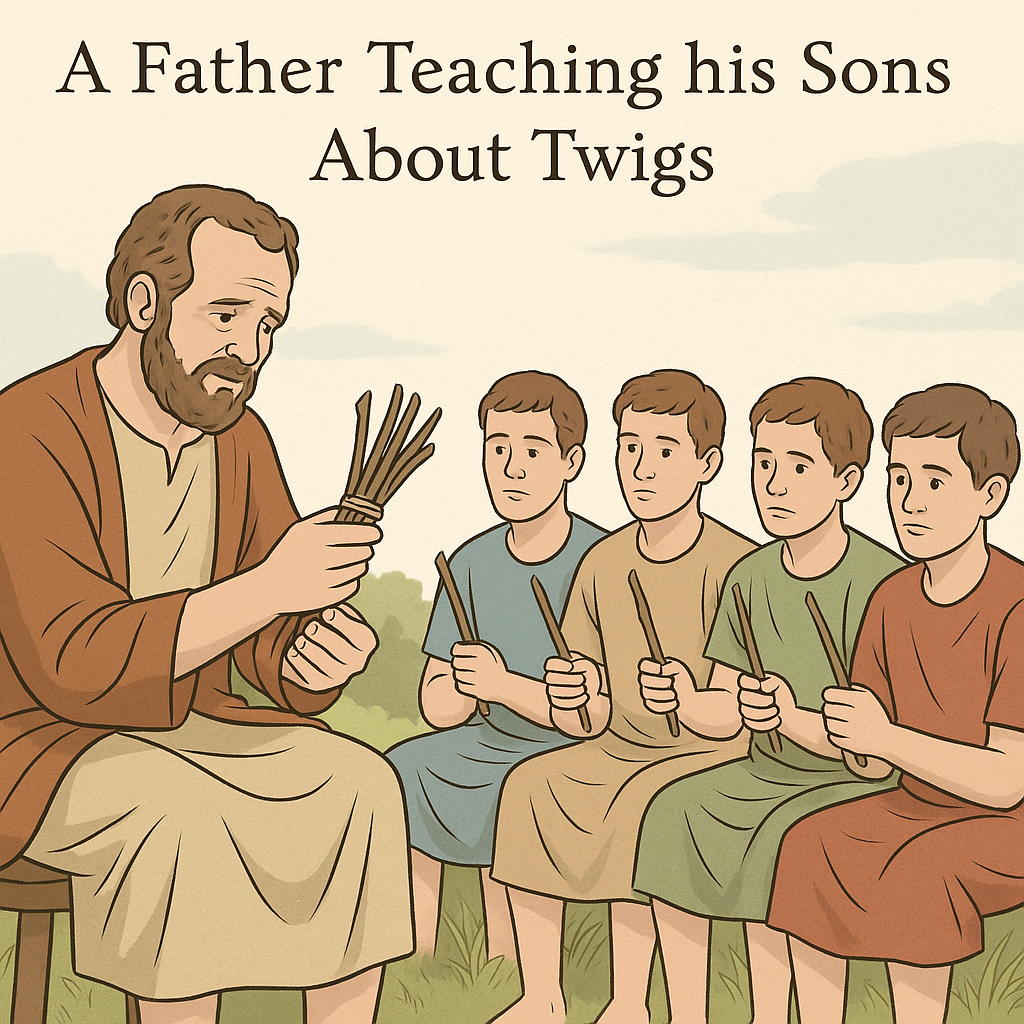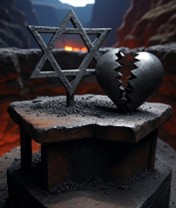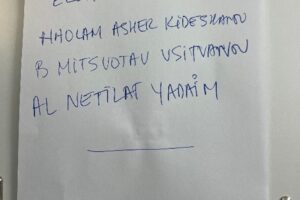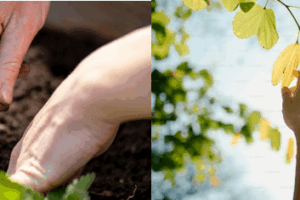- How can we survive the spiritual divide within our own community?
- What is the guiding principle to help us collectively cross the chasm?
The Torah portion, Parsha Korach (Numbers 16:1), speaks of an uprising, not from external enemies, but from within the very heart of the Israelite community. Korach, joined by 250 leaders, challenged the authority of Moses, calling into question not only his leadership but the divine legitimacy of the roles Moses and Aaron had been given. It is a story of ambition, pride, and rupture. A spiritual civil war that follows closely on the heels of reconciliation after the sin of the Golden Calf. Just as the Children of Israel begin to come together again, they are torn apart from within.
I found myself thinking about this rebellion during what should have been a peaceful and joyful moment: a long overdue lunch with an old friend. I had prepared homemade poached fish and eggplant parmigiana. The sun was shining. The table was set for reunion.
But this wasn’t an ordinary Sunday. It was June 15, 2025, the day the United States launched a bold, unprecedented attack against Iranian nuclear sites. For many in the Jewish community, it felt as if our prayers had finally been answered. The USA and Israel were united in the fight against Iranian terror and protection of Israel and destiny for Jews.
The Iranian funded Hamas attacks on October 7, 2023, marked the largest massacre of Jews since the Holocaust. The Iranian IRGC terror regime had long made its genocidal intentions clear by calling for the annihilation of Israel and escalating attacks against US interests. As Iran advanced its nuclear weapons program, what once seemed hypothetical became an existential threat, one that could bring about a second, and potentially final Holocaust.
During World War II, Jews begged the Allied powers to bomb the railway tracks to Auschwitz and slow the slaughter of Jews. The silence then was deafening. Had the United States acted then as it did now, over one-third of my relatives might have avoided the gas chambers and still be alive.
As the world absorbed the morning’s seismic news, I hoped our lunch might offer a quiet break from the headlines.
Charles and I were college teammates on the soccer team. We had always been on the same side, facing the same opponent, shoulder to shoulder. I was therefore stunned when our conversation shifted so sharply. Charles expressed not relief, but dismay, at the US’s actions; without any concern about Iran’s aggression. He lamented the outcome of the 2024 election, questioned whether our current President truly supports Jews or Israel, and dismissed the rise of antisemitism on Ivy League campuses as exaggerated.
I sat silently stunned. My teammate, once beside me on the field, now felt across from me in the world.
I gently shared my own experiences: of family and friends, Israeli, Jewish, and Gulf Arab, living under Iranian missile threat; of Jewish students enduring real fear and harassment on elite campuses; of heartfelt letters from Jewish university presidents and faculty acknowledging the depth of the antisemitism crisis. I even shared my own experiences of discrimination, dismissal, and erasure at the hands of classmates I once called friends. I wasn’t seeking agreement, just a moment of empathy.
But the conversation ended abruptly. “Maybe we’ll see each other before the end of the summer,” Charles said, as he and his wife stood to leave. Though it was nearly 80 degrees, I felt a sudden chill. The sunlight still lit the garden, but the warmth of the moment was gone.
I was left with a haunting question: How can the Jewish people survive the spiritual divide, when even among ourselves the chasm feels so wide?
The Torah begins with division. Cain and Abel are brothers torn apart by pride and jealousy. When God asks Cain about Abel’s fate, Cain deflects: “Am I my brother’s keeper?” That ancient response still echoes. From that moment on, the Jewish story has wrestled with the tension between division and unity.
And yet, in Moses, Aaron, and Miriam we see a vision of restored sibling harmony. Together, they led the Children of Israel from slavery toward Sinai and the Promised Land. Even after the division of the Golden Calf, the Israelites repented, reharmonized, and rebuilt—constructing the Mishkan, a sacred space to house divine presence. Conflict did not define them. Healing and harmony followed.
I was reminded of the old joke: “Two Jews are shipwrecked on a deserted island. How many synagogues do they build? Three. One they attend, one they refuse to attend, and one they wouldn’t be caught dead in.”
Growing up in Allentown, Pennsylvania, my family similarly rotated synagogue memberships among the three local shuls. One we embraced. One we attended while arguing with the rabbi. One we left behind over a disagreement.
Shuls and schisms on an island sanctuary are not just the stuff of jokes, they’re part of our Jewish history. In the 1800s, on the Caribbean island of Curaçao, home to one of the oldest Jewish communities in the Americas, a bitter conflict emerged over whether to introduce organ music into prayer services. Reform-minded Ashkenazi Jews supported the idea. Traditional Sephardic Jews strongly opposed it, citing halacha and sacred tradition. The divide grew so fierce that the community split in 1864, forming two separate congregations. It would take a full century before the two synagogues reunited.
Even in paradise, dissonance can enter, sometimes through a single note of music. Today, our divisions may not be over organs or melodies, but the chords of discord still resonate.
So how do we move forward? I believe there are three deep roots that anchor us against the storm of spiritual fragmentation:
Faith in Hashem: Avram became Avraham when he opened his heart to Hashem. Avram rejected idol worship and adopted monotheism – the belief in only one G-d, Hashem. From that moment, a covenant was born. G-d promised Avram that his descendants would be as numerous as the stars in the sky and the sand in the desert. Today, I see too many Jews return to idol worship and reject G-d, pulled away from our divine covenant. This new form of idol worship is the idolization or demonization of political leaders, the prioritization of ideology over identity. When disdain overtakes faith, spiritual oxygen runs out.
Connection to the Eretz Yisrael, the Promised Land: The Land of Israel is more than a place, it is our Jewish purpose. It was Moses’ divine destiny, the center of Jewish yearning during exile, the unspoken hope in Queen Esther’s Persia. And yet, many Jews today feel disconnected from Israel, even hostile. That detachment is not merely political—it is spiritual amnesia. Without the Promised Land our wandering becomes aimless.
Covenant of Compassion: When Jacob sent Joseph to find his brothers, he asked him to seek their shalom. Joseph did not find harmony, but he searched. He cared. In contrast, Cain shrugged: “Am I my brother’s keeper?” That’s when the divide begins, when we stop asking how our brothers are. Rabbi Sholom Lipskar (of blessed memory), founder of The Shul in Bal Harbour, taught: “When two Jews are together, they should always ask, ‘How can we help the third Jew who is not here with us now?’” Seeing the “shalom of our brothers” is the heartbeat of Jewish unity.
At that lunch, Charles and I disagreed intellectually. That wasn’t the problem. The Torah welcomes disagreement. What hurt was the absence of empathy. I did not feel heard. I felt dismissed.
Medically speaking, a person can be declared brain-dead yet still technically alive. The brain may signal, but the heart pumps life. The heart moves blood to the lungs, sending oxygen to the body.
So too in our community. The Torah is our blood and Faith in Hashem is our oxygen. Without it, we are alive, but not truly breathing.
We may not agree on politics, policies, or presidents. But if we lose compassion, kindness and concern for one another then we lose the very thing that has sustained us through exile, return, and rebirth.
Even the Greeks imagined a divine response to dissonance. Ares, god of war, and Aphrodite, goddess of love, had a daughter: Harmonia, the goddess of harmony. If mythology can birth unity from opposition, perhaps we can too.
Returning to that deserted island, where two Jews built three synagogues, we ask: How can we avoid becoming shipwrecked?
By holding fast to our compass and staying true to our spiritual north.
The Torah, and our faith in Hashem, remain our most compassionate and consistent compass. Even in exile, our yearning for the Promised Land—Eretz Yisrael—points us in the direction of spiritual truth.
Since October 7, 2023, we have witnessed a powerful resurgence of Jewish faith and practice. Baking challah for Shabbat is no longer just a tradition; it has become a sacred act. A biblical braiding that connects family, memory, and community. We’ve heard of hostages in Gaza who kept Shabbat burning bright in their hearts, even in the darkness of terror tunnels. That is the strength of spiritual light; it cannot be extinguished.
May our Jewish community be guided by our eternal signposts: Faith in G-d, Torah, and the shalom of our brothers, to find its way home, toward the Promised Land, not only on a map, but in our souls.
Enjoy a haiku inspired by this blog:
Beneath sunny skies
Hearts can break from cold silence
Torah warms the soul
Appendix:
“Only eyes washed by tears can see clearly”-Louis L. Mann (1865–1931)
The Parable of the Twigs
Once, a wise father gathered his four sons and handed each of them a single twig.
“Break it,” he instructed.
Each son snapped his twig with ease. Then the father took four new twigs, tied them tightly together with a simple cord, and gave the bundle to each of his sons.
“Now, break these,” he said. One by one, the sons tried, but none could snap the bundle.
The father looked at them and said:
“Alone, you are vulnerable. Together, you are unbreakable. Stay united, and no force will divide or destroy you.”

You can read another blog about bridging the divide here.






